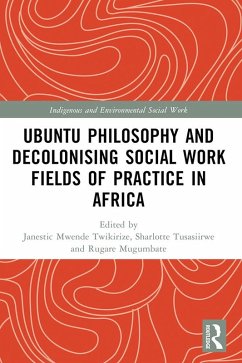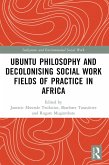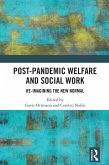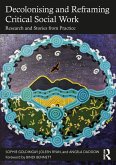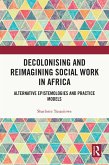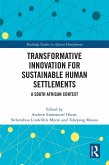Ubuntu Philosophy and Decolonising Social Work Fields of Practice in Africa (eBook, ePUB)
Redaktion: Mwende Twikirize, Janestic; Mugumbate, Rugare; Tusasiirwe, Sharlotte
40,95 €
40,95 €
inkl. MwSt.
Sofort per Download lieferbar

20 °P sammeln
40,95 €
Als Download kaufen

40,95 €
inkl. MwSt.
Sofort per Download lieferbar

20 °P sammeln
Jetzt verschenken
Alle Infos zum eBook verschenken
40,95 €
inkl. MwSt.
Sofort per Download lieferbar
Alle Infos zum eBook verschenken

20 °P sammeln
Ubuntu Philosophy and Decolonising Social Work Fields of Practice in Africa (eBook, ePUB)
Redaktion: Mwende Twikirize, Janestic; Mugumbate, Rugare; Tusasiirwe, Sharlotte
- Format: ePub
- Merkliste
- Auf die Merkliste
- Bewerten Bewerten
- Teilen
- Produkt teilen
- Produkterinnerung
- Produkterinnerung

Bitte loggen Sie sich zunächst in Ihr Kundenkonto ein oder registrieren Sie sich bei
bücher.de, um das eBook-Abo tolino select nutzen zu können.
Hier können Sie sich einloggen
Hier können Sie sich einloggen
Sie sind bereits eingeloggt. Klicken Sie auf 2. tolino select Abo, um fortzufahren.

Bitte loggen Sie sich zunächst in Ihr Kundenkonto ein oder registrieren Sie sich bei bücher.de, um das eBook-Abo tolino select nutzen zu können.
This book addresses a recurrent gap in social work literature by examining Ubuntu as an Indigenous African philosophy that informs social work beyond the largely residual and individualistic conceptualisation of social work that currently prevails in many contexts.
- Geräte: eReader
- mit Kopierschutz
- eBook Hilfe
Andere Kunden interessierten sich auch für
![Ubuntu Philosophy and Decolonising Social Work Fields of Practice in Africa (eBook, PDF) Ubuntu Philosophy and Decolonising Social Work Fields of Practice in Africa (eBook, PDF)]() Ubuntu Philosophy and Decolonising Social Work Fields of Practice in Africa (eBook, PDF)40,95 €
Ubuntu Philosophy and Decolonising Social Work Fields of Practice in Africa (eBook, PDF)40,95 €![Post-Pandemic Welfare and Social Work (eBook, ePUB) Post-Pandemic Welfare and Social Work (eBook, ePUB)]() Post-Pandemic Welfare and Social Work (eBook, ePUB)41,95 €
Post-Pandemic Welfare and Social Work (eBook, ePUB)41,95 €![Decolonising and Reframing Critical Social Work (eBook, ePUB) Decolonising and Reframing Critical Social Work (eBook, ePUB)]() Sophie GoldingayDecolonising and Reframing Critical Social Work (eBook, ePUB)40,95 €
Sophie GoldingayDecolonising and Reframing Critical Social Work (eBook, ePUB)40,95 €![Decolonising and Reimagining Social Work in Africa (eBook, ePUB) Decolonising and Reimagining Social Work in Africa (eBook, ePUB)]() Sharlotte TusasiirweDecolonising and Reimagining Social Work in Africa (eBook, ePUB)40,95 €
Sharlotte TusasiirweDecolonising and Reimagining Social Work in Africa (eBook, ePUB)40,95 €![Social Work and Climate Justice (eBook, ePUB) Social Work and Climate Justice (eBook, ePUB)]() Social Work and Climate Justice (eBook, ePUB)41,95 €
Social Work and Climate Justice (eBook, ePUB)41,95 €![Transformative Innovation for Sustainable Human Settlements (eBook, ePUB) Transformative Innovation for Sustainable Human Settlements (eBook, ePUB)]() Transformative Innovation for Sustainable Human Settlements (eBook, ePUB)44,95 €
Transformative Innovation for Sustainable Human Settlements (eBook, ePUB)44,95 €![Climate Change, Small-Scale Fisheries, and Blue Justice (eBook, ePUB) Climate Change, Small-Scale Fisheries, and Blue Justice (eBook, ePUB)]() Sunil SanthaClimate Change, Small-Scale Fisheries, and Blue Justice (eBook, ePUB)41,95 €
Sunil SanthaClimate Change, Small-Scale Fisheries, and Blue Justice (eBook, ePUB)41,95 €-
-
-
This book addresses a recurrent gap in social work literature by examining Ubuntu as an Indigenous African philosophy that informs social work beyond the largely residual and individualistic conceptualisation of social work that currently prevails in many contexts.
Hinweis: Dieser Artikel kann nur an eine deutsche Lieferadresse ausgeliefert werden.
Dieser Download kann aus rechtlichen Gründen nur mit Rechnungsadresse in A, B, BG, CY, CZ, D, DK, EW, E, FIN, F, GR, HR, H, IRL, I, LT, L, LR, M, NL, PL, P, R, S, SLO, SK ausgeliefert werden.
Hinweis: Dieser Artikel kann nur an eine deutsche Lieferadresse ausgeliefert werden.
Produktdetails
- Produktdetails
- Verlag: Taylor & Francis eBooks
- Seitenzahl: 368
- Erscheinungstermin: 24. Oktober 2023
- Englisch
- ISBN-13: 9781000965599
- Artikelnr.: 69060262
- Verlag: Taylor & Francis eBooks
- Seitenzahl: 368
- Erscheinungstermin: 24. Oktober 2023
- Englisch
- ISBN-13: 9781000965599
- Artikelnr.: 69060262
- Herstellerkennzeichnung Die Herstellerinformationen sind derzeit nicht verfügbar.
Janestic Mwende Twikirize (PhD) is an Associate Professor of Social Work at Makerere University, Uganda. She holds a PhD in Social Work and Social Development. Dr Twikirize served as the Vice President of the Association of Schools of Social Work in Africa (ASSWA) and as a board member of the International Association of Schools of Social Work (IASSW) from 2012 to 2018. Her research with local communities and at the same time her international exposure to various philosophies and discourses in social development led her to pick interest in indigenisation and decoloniality of education and practice. Sharlotte Tusasiirwe (PhD) is an Indigenous African tracing her ancestry from the Basingo clan of Banyankore/Bakiiga/Bahororo tribe of Western Uganda, East of Africa. Sharlotte has been researching and publishing in the area of decolonising social work and she is passionate about seeing culturally appropriate and respectful social work around the world. She is currently a social work lecturer at Western Sydney University, and she is interested in areas of Community-led initiatives and development; African spirituality; Indigenous epistemologies; international social work, among others. Rugare Mugumbate (PhD) is a Zimbabwean social worker who trained at the School of Social Work, University of Zimbabwe and worked at the Epilepsy Support Foundation and the Bindura University of Science Education (BUSE) in Zimbabwe between 2003 and 2015. Among other study areas, his work centers on valuing and using African knowledge such as Ubuntu philosophy in teaching, learning, practice, and research. Presently, he is a lecturer in the School of Health and Society, University of Wollongong, Australia and a Senior Research Associate, Department of Social Work & Community Development, University of Johannesburg, South Africa.
Part I: Theoretical Perspectives - Ubuntu and Decolonising Social Work.
1.Decolonising social work fields of practice: An introduction. 2.Ubuntu:
an overview. 3.Ubuntu in international social work. Part II: Ubuntu and
Decolonising Social Work Ethics and Fieldwork. 4.Ubuntu and decolonising
Biestek's (1957) seven principles of the casework relationship. 5.Ubuntu
principles: unethically ethical? Decolonising social work values and ethics
in Social Work practice and research. 6.Decolonizing Social Work Fieldwork
Education in Africa: Approaches, Challenges, and Prospects. Part III:
Ubuntu and Social Work with Families. 7.Ubuntu Social Work with Individuals
and Families: A Process Model. 8.Collective Child Rearing in Igboland as a
Panacea to Juvenile Delinquency: A Philosophical Analysis. 9.Ubuntu in
Gerontological Social Work: A community-led care model. 10.Community
solidarity and intergenerational relationships in the care of older people
in Africa. 11.Philosophies guiding the model of care for older adults in
the traditional Igbo society, southeast Nigeria: A guide for social work
decolonization agenda. Part IV: Ubuntu and Environmental Social Work.
12.The Efficacy of Ubuntu on Environmental Social Work in Africa.
13.Leveraging Ubuntu philosophy as a vehicle for promoting environmental
justice in Zimbabwe. 14.Enhancing Environmental Conditions of Slum
Settlement Dwellers in Africa: Putting Ubuntu and Community Social Work
into Perspective. 15.Ubuntu and social work in emergencies: Opportunities
for community-based disaster risk management in Zimbabwe. Part V: Ubuntu
and Other Fields of Practice. 16.Ubuntu-informed approaches for addressing
Conflict-Related Sexual Violence (CRSV): Scope, rationale, and implications
for Social Work. 17.Towards Decolonisation of Social Work Practice in
Response to the Drug Abuse Problem in Africa. 18.Ubuntu philosophy and
sexual behaviours in Zimbabwe: Implications for social work. 19."Agbajo Owo
La Fin Soya Ajeji Owo Kan Ko Gbe Eru De Ori": A Social Work Perspective on
the Collective Action of the End SARS Protest in Nigeria. Part VI: Looking
Ahead. 20.Ubuntu inspired tools and models to decolonise social work
practice. 21.Conclusions: Furthering decolonising social work in Africa.
1.Decolonising social work fields of practice: An introduction. 2.Ubuntu:
an overview. 3.Ubuntu in international social work. Part II: Ubuntu and
Decolonising Social Work Ethics and Fieldwork. 4.Ubuntu and decolonising
Biestek's (1957) seven principles of the casework relationship. 5.Ubuntu
principles: unethically ethical? Decolonising social work values and ethics
in Social Work practice and research. 6.Decolonizing Social Work Fieldwork
Education in Africa: Approaches, Challenges, and Prospects. Part III:
Ubuntu and Social Work with Families. 7.Ubuntu Social Work with Individuals
and Families: A Process Model. 8.Collective Child Rearing in Igboland as a
Panacea to Juvenile Delinquency: A Philosophical Analysis. 9.Ubuntu in
Gerontological Social Work: A community-led care model. 10.Community
solidarity and intergenerational relationships in the care of older people
in Africa. 11.Philosophies guiding the model of care for older adults in
the traditional Igbo society, southeast Nigeria: A guide for social work
decolonization agenda. Part IV: Ubuntu and Environmental Social Work.
12.The Efficacy of Ubuntu on Environmental Social Work in Africa.
13.Leveraging Ubuntu philosophy as a vehicle for promoting environmental
justice in Zimbabwe. 14.Enhancing Environmental Conditions of Slum
Settlement Dwellers in Africa: Putting Ubuntu and Community Social Work
into Perspective. 15.Ubuntu and social work in emergencies: Opportunities
for community-based disaster risk management in Zimbabwe. Part V: Ubuntu
and Other Fields of Practice. 16.Ubuntu-informed approaches for addressing
Conflict-Related Sexual Violence (CRSV): Scope, rationale, and implications
for Social Work. 17.Towards Decolonisation of Social Work Practice in
Response to the Drug Abuse Problem in Africa. 18.Ubuntu philosophy and
sexual behaviours in Zimbabwe: Implications for social work. 19."Agbajo Owo
La Fin Soya Ajeji Owo Kan Ko Gbe Eru De Ori": A Social Work Perspective on
the Collective Action of the End SARS Protest in Nigeria. Part VI: Looking
Ahead. 20.Ubuntu inspired tools and models to decolonise social work
practice. 21.Conclusions: Furthering decolonising social work in Africa.
Part I: Theoretical Perspectives - Ubuntu and Decolonising Social Work.
1.Decolonising social work fields of practice: An introduction. 2.Ubuntu:
an overview. 3.Ubuntu in international social work. Part II: Ubuntu and
Decolonising Social Work Ethics and Fieldwork. 4.Ubuntu and decolonising
Biestek's (1957) seven principles of the casework relationship. 5.Ubuntu
principles: unethically ethical? Decolonising social work values and ethics
in Social Work practice and research. 6.Decolonizing Social Work Fieldwork
Education in Africa: Approaches, Challenges, and Prospects. Part III:
Ubuntu and Social Work with Families. 7.Ubuntu Social Work with Individuals
and Families: A Process Model. 8.Collective Child Rearing in Igboland as a
Panacea to Juvenile Delinquency: A Philosophical Analysis. 9.Ubuntu in
Gerontological Social Work: A community-led care model. 10.Community
solidarity and intergenerational relationships in the care of older people
in Africa. 11.Philosophies guiding the model of care for older adults in
the traditional Igbo society, southeast Nigeria: A guide for social work
decolonization agenda. Part IV: Ubuntu and Environmental Social Work.
12.The Efficacy of Ubuntu on Environmental Social Work in Africa.
13.Leveraging Ubuntu philosophy as a vehicle for promoting environmental
justice in Zimbabwe. 14.Enhancing Environmental Conditions of Slum
Settlement Dwellers in Africa: Putting Ubuntu and Community Social Work
into Perspective. 15.Ubuntu and social work in emergencies: Opportunities
for community-based disaster risk management in Zimbabwe. Part V: Ubuntu
and Other Fields of Practice. 16.Ubuntu-informed approaches for addressing
Conflict-Related Sexual Violence (CRSV): Scope, rationale, and implications
for Social Work. 17.Towards Decolonisation of Social Work Practice in
Response to the Drug Abuse Problem in Africa. 18.Ubuntu philosophy and
sexual behaviours in Zimbabwe: Implications for social work. 19."Agbajo Owo
La Fin Soya Ajeji Owo Kan Ko Gbe Eru De Ori": A Social Work Perspective on
the Collective Action of the End SARS Protest in Nigeria. Part VI: Looking
Ahead. 20.Ubuntu inspired tools and models to decolonise social work
practice. 21.Conclusions: Furthering decolonising social work in Africa.
1.Decolonising social work fields of practice: An introduction. 2.Ubuntu:
an overview. 3.Ubuntu in international social work. Part II: Ubuntu and
Decolonising Social Work Ethics and Fieldwork. 4.Ubuntu and decolonising
Biestek's (1957) seven principles of the casework relationship. 5.Ubuntu
principles: unethically ethical? Decolonising social work values and ethics
in Social Work practice and research. 6.Decolonizing Social Work Fieldwork
Education in Africa: Approaches, Challenges, and Prospects. Part III:
Ubuntu and Social Work with Families. 7.Ubuntu Social Work with Individuals
and Families: A Process Model. 8.Collective Child Rearing in Igboland as a
Panacea to Juvenile Delinquency: A Philosophical Analysis. 9.Ubuntu in
Gerontological Social Work: A community-led care model. 10.Community
solidarity and intergenerational relationships in the care of older people
in Africa. 11.Philosophies guiding the model of care for older adults in
the traditional Igbo society, southeast Nigeria: A guide for social work
decolonization agenda. Part IV: Ubuntu and Environmental Social Work.
12.The Efficacy of Ubuntu on Environmental Social Work in Africa.
13.Leveraging Ubuntu philosophy as a vehicle for promoting environmental
justice in Zimbabwe. 14.Enhancing Environmental Conditions of Slum
Settlement Dwellers in Africa: Putting Ubuntu and Community Social Work
into Perspective. 15.Ubuntu and social work in emergencies: Opportunities
for community-based disaster risk management in Zimbabwe. Part V: Ubuntu
and Other Fields of Practice. 16.Ubuntu-informed approaches for addressing
Conflict-Related Sexual Violence (CRSV): Scope, rationale, and implications
for Social Work. 17.Towards Decolonisation of Social Work Practice in
Response to the Drug Abuse Problem in Africa. 18.Ubuntu philosophy and
sexual behaviours in Zimbabwe: Implications for social work. 19."Agbajo Owo
La Fin Soya Ajeji Owo Kan Ko Gbe Eru De Ori": A Social Work Perspective on
the Collective Action of the End SARS Protest in Nigeria. Part VI: Looking
Ahead. 20.Ubuntu inspired tools and models to decolonise social work
practice. 21.Conclusions: Furthering decolonising social work in Africa.
